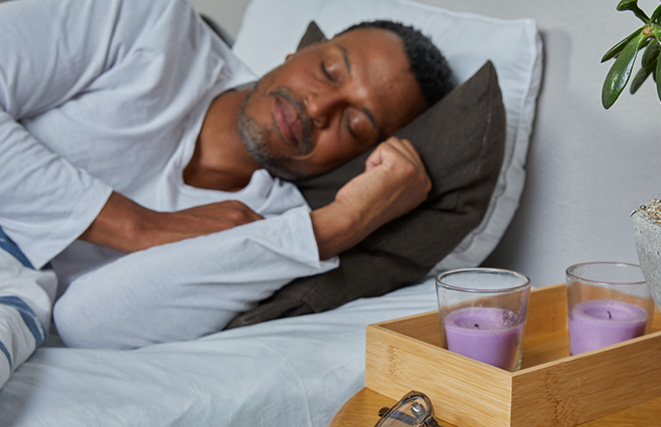It is 2 am and you’re still awake? Keep in mind that getting a good night’s rest isn’t just a nice habit to have, it’s crucial for your overall health and well-being (National Institutes of Health, 2021).
Thankfully, you can incorporate some straightforward yet powerful habits to encourage restful sleep and bid farewell to those wakeful nights once and for all. This article will dive into seven key strategies to help you establish a bedtime routine that primes you for good sleep.
1. Maintain a regular schedule
Strive to set a regular sleep schedule by hitting the hay and rising at the same time daily, even on weekends. This routine helps synchronize your body’s internal clock, making it simpler to drift off and wake up feeling great. Steer clear of drastic shifts in your sleep routine, as they can throw off your body’s natural rhythm (Irish et al., 2015).
2. Practice sleep hygiene
Craft a soothing bedtime ritual to signal to your body that it’s time to unwind. Try calming activities like curling up with a good book, soaking in a warm bath, or practicing relaxation methods like good breathing or meditation.
Steer clear of stimulating activities that can disrupt your sleep, like watching TV or scrolling through bright screens on electronic devices.
3. Optimize your sleeping environment
Turn your bedroom into a sleep sanctuary that promotes relaxation and tranquility. Keep the space cool, dark, and quiet to minimize disturbances while you snooze (Mayo Clinic, 2022). Treat yourself to cozy bedding, supportive pillows, and a mattress that gives your spine the support it deserves.
Think about adding blackout curtains, earplugs, or a white noise machine to your sleep arsenal to block out any pesky external noise or light that might disturb your slumber.
4. Limit exposure to screens
Cut back on your screen time, especially with blue light-emitting devices, in the hours leading up to bedtime. You may steer clear of smartphones, tablets, computers, and TVs before bedtime (National Sleep Foundation, 2022). Instead, unwind with calming activities like reading a physical book, listening to soothing music, or practicing gentle stretching exercises.
5. Control your diet and hydration
Be mindful of your food and drink choices, as certain items can impact your sleep quality (St-Onge, Mikic & Pietrolungo, 2016). Steer clear of caffeine and alcohol close to bedtime, as they can throw off your sleep patterns and cause nighttime awakenings. Instead, go for light, easily digestible snacks and beverages (Spadola, et al. 2019).
6. Exercise regularly
Make regular physical activity a part of your daily routine to support both sleep quality and overall health. Shoot for at least 60 minutes of moderate-intensity exercise most days of the week.
Engage in activities such as walking earlier in the day to reap the sleep-enhancing benefits of exercise (Sejbuk, Mirończuk-Chodakowska & Witkowska, 2022).
7. Limit naps
While napping can provide a temporary energy boost, excessive or late naps can disrupt your nighttime sleep. Limit daytime naps and avoid napping late in the afternoon or evening, as it can interfere with your ability to fall asleep at bedtime. If you feel the need to nap, aim to do so earlier in the day and keep it short to avoid compromising your nighttime sleep (Bilodeau, 2023).
Sources:
Sejbuk, M., Mirończuk-Chodakowska, I., & Witkowska, A. M. (2022). Sleep Quality: A Narrative Review on Nutrition, Stimulants, and Physical Activity as Important Factors. Nutrients, 14(9), 1912. https://doi.org/10.3390/nu14091912
St-Onge, M. P., Mikic, A., & Pietrolungo, C. E. (2016). Effects of Diet on Sleep Quality. Advances in nutrition (Bethesda, Md.), 7(5), 938–949. https://doi.org/10.3945/an.116.012336
Irish, L. A., Kline, C. E., Gunn, H. E., Buysse, D. J., & Hall, M. H. (2015). The role of sleep hygiene in promoting public health: A review of empirical evidence. Sleep medicine reviews, 22, 23–36. https://doi.org/10.1016/j.smrv.2014.10.001
Spadola, C. E., Guo, N., Johnson, D. A., Sofer, T., Bertisch, S. M., Jackson, C. L., Rueschman, M., Mittleman, M. A., Wilson, J. G., & Redline, S. (2019). Evening intake of alcohol, caffeine, and nicotine: night-to-night associations with sleep duration and continuity among African Americans in the Jackson Heart Sleep Study. Sleep, 42(11), zsz136. https://doi.org/10.1093/sleep/zsz136
Bilodeau, K. (2023, September 22). Is your daily nap doing more harm than good? Harvard Health. https://www.health.harvard.edu/staying-healthy/is-your-daily-nap-doing-more-harm-than-good
National Sleep Foundation. (2022, March 13). Screen use disrupts precious sleep time. https://www.thensf.org/screen-use-disrupts-precious-sleep-time/#
Mayo Clinic. (2022, May 7). Sleep tips: 6 steps to better sleep.
National Institutes of Health. (2021, April). Good Sleep for Good Health. https://newsinhealth.nih.gov/2021/04/good-sleep-good-health#:~:text=Good%20sleep%20improves%20your%20brain,stroke%20to%20obesity%20and%20dementia.


